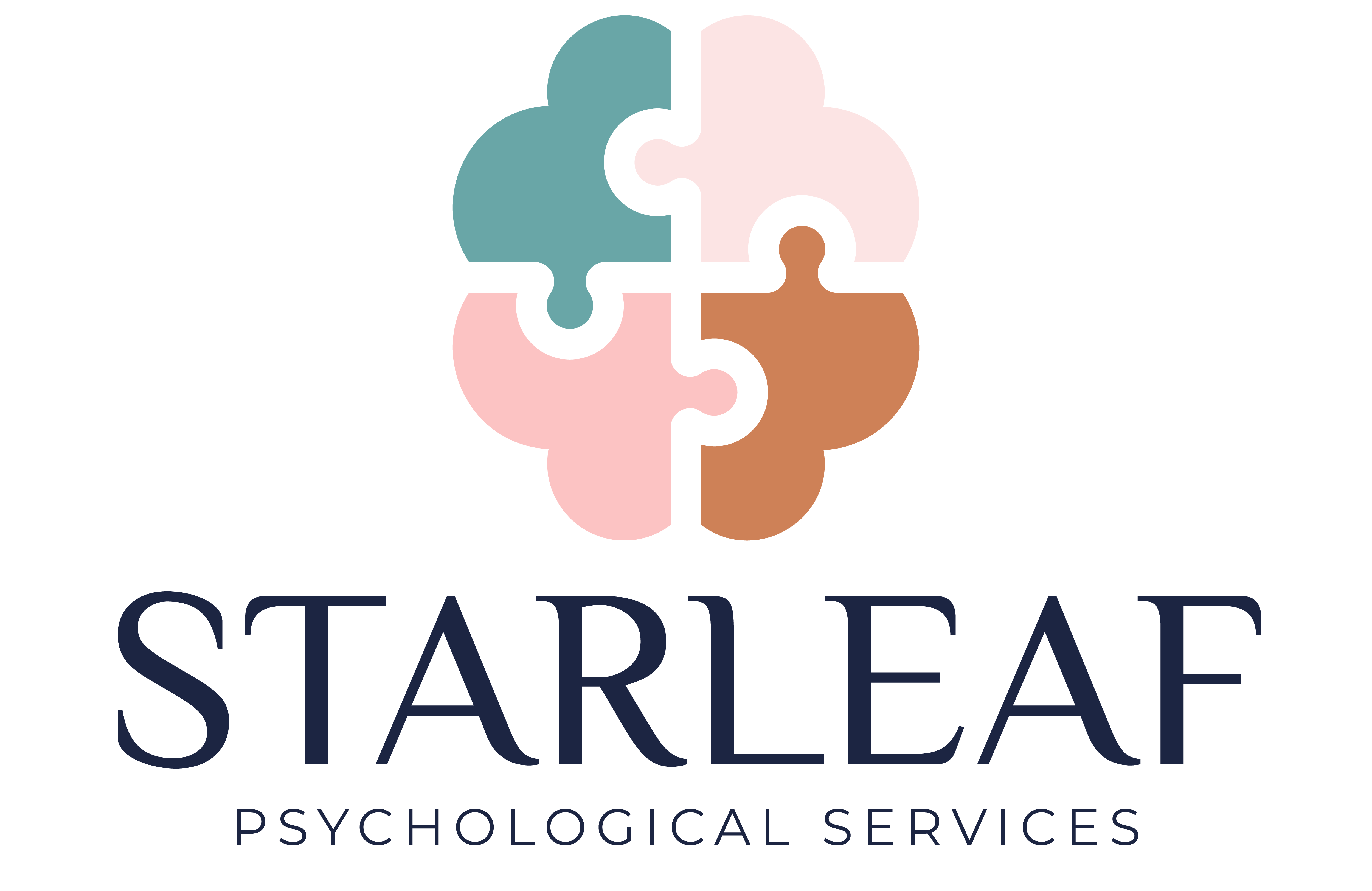
Assessment Process

Assessment Process
Your Guide to Evaluations in Pasadena
At Starleaf Psychological Services, located in Pasadena and serving the Los Angeles County area, Dr. Jade Starleaf is committed to providing comprehensive and thorough assessments for a range of neurodevelopmental and mental health conditions, including Autism Spectrum Disorder (ASD), Attention-Deficit/Hyperactivity Disorder 1 (ADHD), Obsessive-Compulsive Disorder (OCD), and 2 Twice Exceptional (2E) profiles, as well as anxiety-related conditions and more. This page outlines our step-by-step assessment process to help families and referring professionals understand what to expect.
Our goal is to provide clarity, accurate diagnoses, and actionable recommendations to support individuals and their families. Dr. Starleaf integrates evidence-based practices with a compassionate and personalized approach to ensure a positive and informative assessment experience.
Step-by-Step Guide to the Assessment Process
The specific steps involved may vary slightly depending on the condition being assessed and the individual’s age and needs. However, the general process at Starleaf Psychological Services typically includes the following stages:
1. Initial Inquiry and Intake
- Contacting Our Office: Families or referring professionals reach out to Starleaf Psychological Services via phone or email to inquire about an assessment.
- Brief Initial Discussion: Dr. Starleaf or our administrative staff will have a brief conversation to understand the primary concerns, the individual’s age, and the type of assessment being requested.
- Intake Forms: If an assessment seems appropriate, we will provide initial intake forms to be completed. These forms gather background information, developmental history, current symptoms, and relevant medical and educational history.
2. Initial Consultation/Clinical Interview:
This consists of two separate sessions: the first is the Intake for Therapy, and the second is the ADI.
- Intake Session (60–90 minutes)
The intake session is a comprehensive 60–90 minute appointment where we explore your concerns, developmental and medical history, and the specific questions you’re hoping the assessment can answer.
- Autism Diagnostic Interview (ADI-R)
If autism is a question, we may also complete the Autism Diagnostic Interview (ADI-R)—a structured, research-backed interview with parents or caregivers designed to gather detailed information about developmental history and current functioning related to autism spectrum symptoms.
This session sets the foundation for the rest of the evaluation.
- Meeting with Dr. Starleaf: This initial session involves a more in-depth discussion with Dr. Starleaf. For child and adolescent assessments, this typically includes parents or guardians. For young adults, it involves the individual and may include family members with their consent.
- Gathering Detailed History: Dr. Starleaf will gather a comprehensive developmental, medical, social, and educational history. We will discuss current concerns, symptom onset, duration, and impact on daily functioning.
- Determining Assessment Needs: Based on the initial consultation, Dr. Starleaf will determine the most appropriate assessment tools and procedures to address the specific questions and concerns.
2a. Additional Steps Prior to Testing
Before the formal assessment sessions, we often complete the following: a battery of questionnaires, consultations with other professionals (e.g., physicians or therapists), and school observations if necessary.
Gathering Multiple Perspectives
After the intake, we’ll send standardized questionnaires to you, and potentially to teachers, caregivers, or other relevant individuals. These help us understand behavior, emotional functioning, and social development across environments.
We may also reach out to other providers (with your consent)—such as pediatricians, therapists, or psychiatrists—for collateral information.
In some cases, we’ll conduct a school observation to see your child in their natural learning environment and assess classroom behavior, attention, and social interaction.
3. Assessment Sessions
- Administering Standardized Tests: Depending on the condition being evaluated, assessment sessions may involve the administration of various standardized tests. These might include:
- ASD: Autism Diagnostic Observation Schedule (ADOS-2), Autism Diagnostic Interview-Revised (ADI-R) (often through parent interview).
- ADHD: Standardized rating scales (completed by parents, teachers, and the individual), behavioral observations, and potentially cognitive and executive function tests.
- OCD and Anxiety: Clinical interviews, symptom checklists, and standardized anxiety and OCD scales.
- 2E: Intellectual assessments (e.g., WISC-V, WAIS-IV), achievement tests, and measures to screen for learning disabilities or other co-occurring conditions.
- Neuropsychological: A broader battery of tests assessing various cognitive domains (attention, memory, executive functions, language, visual-spatial skills, etc.).
- Behavioral Observations: Dr. Starleaf may observe the individual’s behavior and interactions during the assessment sessions.
- Review of Records: With your consent, we may review relevant school records, previous evaluations, or medical reports.
4. Scoring and Interpretation:
- Data Analysis: Dr. Starleaf will score and analyze the data collected from the interviews, standardized tests, and observations.
- Integration of Information: The test results are integrated with the clinical history and behavioral observations to form a comprehensive understanding of the individual’s strengths and challenges.
6. Comprehensive Report:
- Written Summary: Following the feedback session, a comprehensive written report summarizing the assessment process, findings, diagnostic impressions, and detailed recommendations will be provided. This report can be shared with other professionals (e.g., therapists, educators) with your consent.
What to Expect During an Assessment:
- Comfortable and Supportive Environment: We strive to create a calm and supportive atmosphere during all assessment sessions.
- Respect for Individual Needs: Dr. Starleaf will work at a pace that is comfortable for the individual and will accommodate any specific needs or concerns.
- Engagement and Interaction: Assessment sessions may involve a variety of activities, questions, and tasks designed to evaluate different skills and behaviors.
- Breaks as Needed: For longer assessment sessions, breaks will be provided to ensure the individual remains comfortable and engaged.
- Open Communication: Dr. Starleaf encourages open communication and will answer your questions throughout the process.
Forms or Pre-Assessment Questionnaires (If Applicable):
Upon scheduling an assessment, you will typically receive online forms to complete prior to your initial consultation. These may include:
- Intake Questionnaire: Gathering basic demographic information and the primary reasons for seeking assessment.
- Developmental History Questionnaire: Collecting detailed information about the individual’s developmental milestones and history.
- Behavioral Rating Scales: Depending on the suspected condition (e.g., ADHD, anxiety), you may be asked to complete standardized rating scales.
- Background Information Forms: Gathering relevant medical and educational history.
Completing these forms thoroughly and in advance helps Dr. Starleaf gain a better understanding of the individual’s background and allows for a more focused and productive initial consultation.
Frequently Asked Questions (FAQs)
For Families:
How long does the entire assessment process take?
The duration can vary depending on the complexity of the case and the specific assessments required. Typically, it can range from a few weeks to a couple of months, including the initial consultation, testing sessions, scoring, and feedback.The duration can vary depending on the complexity of the case and the specific assessments required. Typically, it can range from a few weeks to a couple of months, including the initial consultation, testing sessions, scoring, and feedback.
What is the cost of the assessment?
The cost of the assessment varies depending on the type of evaluation and the specific tests administered. We will provide a detailed breakdown of fees during the initial inquiry. We can also discuss payment options.
What should I bring to the assessment sessions?
We will inform you of any specific items to bring prior to your appointment. This may include previous reports, school records, or a list of medications.
Can I be present during my child's assessment sessions?
We will inform you of any specific items to bring prior to your appointment. This may include previous reports, school records, or a list of medications.
What happens after the assessment is complete?
Following the feedback session, you will receive a comprehensive written report—typically within 4 to 6 weeks—that includes diagnostic impressions (if applicable) and personalized recommendations for next steps, such as therapy, educational supports, and relevant community resources in the Los Angeles County area.
For Referring Professionals:
How can I refer a patient for assessment?
You can refer a patient by contacting our office via phone or email. Please provide relevant background information and the specific questions you would like the assessment to address. We will then coordinate directly with the patient or their family.
What information should I include in the referral?
Please include the patient’s identifying information, a summary of the presenting concerns, relevant medical and developmental history, any previous evaluations or diagnoses, and the specific questions you would like the assessment to address.
Will I receive a copy of the assessment report?
With the patient’s or their legal guardian’s written consent, we will gladly provide you with a copy of the comprehensive assessment report.
Does Dr. Starleaf collaborate with schools and other professionals?
Yes, Dr. Starleaf believes in a collaborative approach and will work with schools, therapists, and other professionals involved in the individual’s care with the appropriate consent.
What types of assessments does Dr. Starleaf conduct?
Dr. Starleaf conducts comprehensive assessments for ASD, ADHD, OCD, anxiety-related conditions, Twice Exceptional (2E) profiles, and neuropsychological evaluations for children, teens, and young adults.
Ready to get started?
If you are a family seeking a comprehensive assessment for your child, teen, or young adult, or a referring professional looking for expert evaluation services in the Pasadena or Los Angeles County area, please contact Dr. Jade Starleaf at Starleaf Psychological Services. We are here to provide clarity, understanding, and support. Schedule an initial inquiry today to begin the assessment process.


